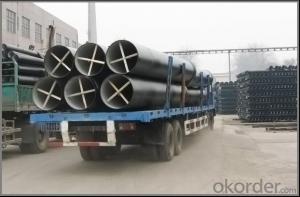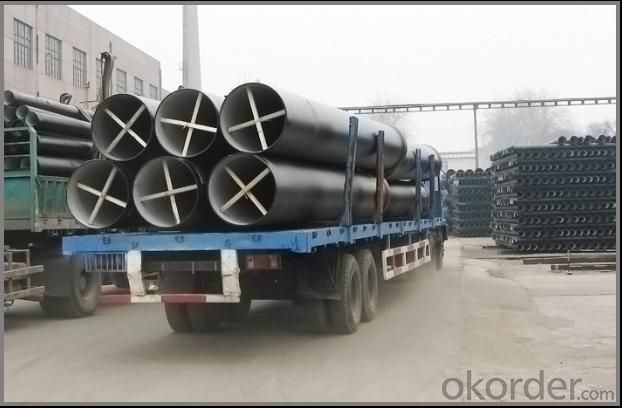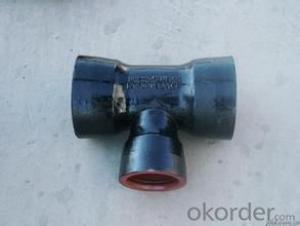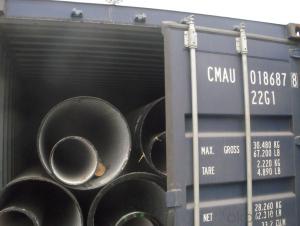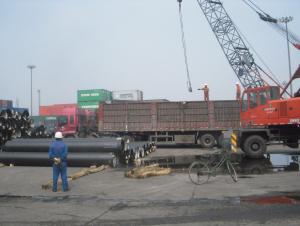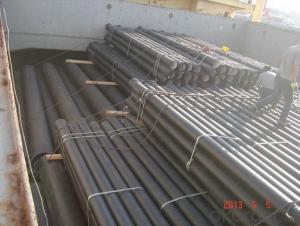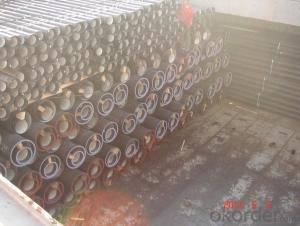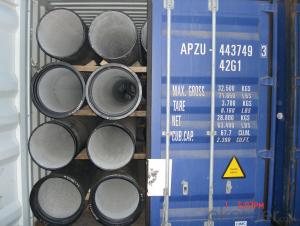DUCTILE IRON PIPES AND PIPE FITTINGS K8 CLASS DN350
- Loading Port:
- Tianjin
- Payment Terms:
- TT OR LC
- Min Order Qty:
- 22 pc
- Supply Capability:
- 3000 pc/month
OKorder Service Pledge
OKorder Financial Service
You Might Also Like
Material : Ductile Cast Iron
Size Range : DN 80mm to DN 2000mm
Unit Effective Length : 6m or 5.7m
Manufacture Standard: ISO 2531:1998/ EN 545:2006/EN 598:2007
Annual capacity : 200,000 tons
Coating Exterior: Zinc 130g/m2 according to ISO 8179-1 and bitumen coating 70 microns.
Cement Interior: Portland Cement/ High Alumina Cement/ Sulphate Resisting Cement Lining according to ISO 4179
Special requirements on external coating and internal lining can be applied
We also provide accessories such as SBR/EPDM rubber gaskets, lubricant paste, pipe caps, PE sleeves, etc.
Additional Parts:
Each pipe is strictly inspected according to related standard to ensure permanently high performance.
Easy Installation at site and service free for life
Long Service Lifespan
Quotation will arrive you within 24hours once we get your inquiry.
We guarantee offering you a competitive price.
A copy of original inspection reports of pipes will be offered after shipment.
Photos of loading process will be sent to the customer after shipment effect.
We will follow-up the delivery progress after shipment effect and update to the customer on weekly basis.
- Q: Are ductile iron pipes resistant to UV degradation?
- No, ductile iron pipes are not resistant to UV degradation.
- Q: How can the internal and external walls of ductile iron pipes be protected from corrosion?
- Inner wall cement anticorrosive exterior wall asphalt anticorrosion
- Q: What are the different methods for tapping ductile iron pipe?
- There are several different methods for tapping ductile iron pipe, depending on the specific requirements of the project. Some of the common methods used include: 1. Mechanical Tapping: This method involves using a mechanical tapping machine to create a hole in the ductile iron pipe. The machine is equipped with a cutting tool that rotates and cuts through the pipe wall, creating a clean hole. This method is commonly used for smaller diameter pipes and is relatively quick and efficient. 2. Hot Tapping: Hot tapping involves creating a hole in a pressurized ductile iron pipe while it is still in service. This method requires specialized equipment and expertise to ensure safety and maintain the integrity of the pipe. Hot tapping is commonly used when it is not feasible or practical to shut down the pipeline for maintenance or repair work. 3. Electrofusion Tapping: Electrofusion tapping is a method that uses an electrofusion saddle and fitting to create a branch connection on a ductile iron pipe. This method involves welding a fitting onto the pipe using an electrofusion machine, which creates a secure and leak-proof connection. Electrofusion tapping is commonly used for larger diameter pipes and is suitable for both water and gas applications. 4. Saddle Tapping: Saddle tapping involves attaching a saddle or clamp onto the ductile iron pipe and drilling a hole through the saddle into the pipe. The saddle is then equipped with a threaded outlet for connecting a branch line. This method is commonly used for smaller diameter pipes and is relatively simple and cost-effective. 5. Split Sleeve Tapping: Split sleeve tapping is a method that involves cutting a section out of the ductile iron pipe and installing a split sleeve over the cut. The split sleeve is then bolted together, creating a secure and watertight connection. This method is commonly used for larger diameter pipes and is suitable for both water and gas applications. It is important to note that the selection of the tapping method should be based on factors such as the pipe size, pressure rating, required branch connection, and the specific requirements of the project. Consulting with a professional engineer or tapping specialist is recommended to ensure the proper method is used for tapping ductile iron pipe.
- Q: How do ductile iron pipes handle ground movement near rivers and lakes?
- Due to their unique properties and construction, ductile iron pipes are an ideal choice for managing ground movement near rivers and lakes. These pipes, made from a type of cast iron known for its strength and flexibility, possess exceptional resistance to both ground movement and external forces. One notable characteristic of ductile iron pipes is their ability to endure bending and stretching without breaking. This remarkable flexibility enables the pipes to accommodate ground movements, whether caused by natural phenomena like soil settling, erosion, or even seismic activity. By absorbing and dispersing the stress induced by ground movement, these pipes minimize the risk of cracks or fractures. Moreover, ductile iron pipes exhibit high impact resistance, enabling them to withstand external forces such as pressure from shifting soil or heavy machinery. This quality makes them less susceptible to damage during ground movements in areas prone to erosion or flooding near rivers and lakes. Furthermore, ductile iron pipes feature smooth internal surfaces, reducing friction and resistance to the flow of water. This ensures efficient water transportation even in regions experiencing ground movement, preventing potential blockages or disruptions to the water supply system. To further enhance their ability to withstand ground movement, ductile iron pipes are commonly installed using flexible joints, such as restrained joints or push-on joints, depending on the specific project requirements. These joints allow the pipes to move slightly without causing harm to the overall system, providing additional protection against ground movement near rivers and lakes. In conclusion, ductile iron pipes possess the necessary strength, flexibility, impact resistance, and smooth internal surfaces to effectively manage ground movement near rivers and lakes. These qualities make them a reliable choice for water transportation systems in areas prone to ground movement, ensuring the creation of a durable and efficient infrastructure for the supply of water.
- Q: What is the use of ductile iron?
- Manufacturer of automotive diesel engines are starting from the prolong engine life, particularly cautious about expressing selection of crankshaft material, when the isothermal bainitic ductile iron and high strength in order to increase the power to weight ratio, expand the turbocharger use influence design according to the material, equipped with exhaust turbocharger tube the temperature is increased to 500 to 70. C, in this condition, the oxidation and creep strength become important. Ductile iron, with good properties, is being used instead of gray iron for the exhaust pipe and will further use silicon aluminum alloy ductile iron as the temperature increases.
- Q: Are ductile iron pipes suitable for irrigation canal systems?
- Absolutely, irrigation canal systems can indeed benefit from the use of ductile iron pipes. These pipes have gained recognition for their exceptional robustness and durability, rendering them exceptionally well-suited for withstanding the immense pressure and load demands of irrigation canal systems. They exhibit remarkable resistance to external forces, such as heavy machinery, and can effortlessly endure the stresses caused by soil movement and settlement. Moreover, ductile iron pipes boast remarkable resistance to corrosion and feature a flawlessly smooth inner surface. This smoothness significantly reduces friction and ensures a highly efficient flow of water. This particular quality is of utmost importance in irrigation systems, as it enables the effective distribution of water to crops, thereby guaranteeing their optimal growth and yield. Furthermore, ductile iron pipes boast an impressively long lifespan, often exceeding a century. This longevity makes them a truly cost-effective option for irrigation canal systems. Additionally, their minimal maintenance requirements further enhance their suitability for this particular application. Ultimately, ductile iron pipes possess all the essential characteristics necessary for irrigation canal systems, including strength, durability, corrosion resistance, and efficiency. As such, they represent a highly fitting choice for the purpose at hand.
- Q: How do ductile iron pipes handle differential settlement?
- Ductile iron pipes have the ability to handle differential settlement due to their inherent flexibility and strength. The material's ductility allows the pipes to withstand minor ground movements and settlement without causing significant damage or failure. The pipes can flex and adjust to the changing ground conditions, reducing the risk of cracks or breaks. Additionally, the inherent strength of ductile iron pipes helps distribute the load evenly, minimizing the impact of settlement on the overall integrity of the pipeline system.
- Q: What is the typical weight of ductile iron pipes?
- The weight of ductile iron pipes can differ according to their size and thickness. Nonetheless, as a broad reference, smaller diameter pipes typically weigh around 1 pound per foot, while larger diameter pipes can weigh several hundred pounds per foot. The weight of ductile iron pipes is influenced by factors like the dimensions of the pipes, the thickness of their walls, and the particular requirements of the intended use. It is essential to acknowledge that these weights are approximate and subject to variation depending on the manufacturer and product specifications.
- Q: How do ductile iron pipes perform in high-pressure applications?
- Ductile iron pipes are highly renowned for their exceptional strength and durability, making them incredibly suitable for applications with high pressure. These pipes are specifically designed to endure immense internal and external pressures, making them well-suited for both underground and above-ground installations where high-pressure conditions are anticipated. One of the primary advantages of utilizing ductile iron pipes in high-pressure applications lies in their capacity to resist cracking or bursting. The material's inherent ductility enables it to absorb and distribute pressure evenly, significantly reducing the risk of failure under high-pressure circumstances. Consequently, ductile iron pipes are a dependable choice for water supply systems, oil and gas pipelines, and other demanding applications subject to substantial pressure. Moreover, ductile iron pipes exhibit outstanding corrosion resistance properties, further enhancing their performance in high-pressure environments. These pipes are typically coated with a protective layer, such as cement mortar or epoxy, which serves as a barrier against corrosion. By preventing the formation of rust or scale inside the pipe, this protective coating ensures smooth flow and upholds structural integrity even under high-pressure conditions. Furthermore, ductile iron pipes possess a remarkable tolerance for external loads, including soil pressure, traffic loads, and various other forces. This exceptional strength enables them to withstand the additional stress often encountered in high-pressure applications, guaranteeing the long-term reliability and performance of the pipe system. In conclusion, ductile iron pipes offer exceptional performance in high-pressure applications. Their strength, durability, corrosion resistance, and ability to withstand external loads make them a reliable choice for a wide range of industries and infrastructure projects where high-pressure conditions are a significant concern.
- Q: Do ductile iron pipes have inner enamel?
- Internal enamel ductile iron pipe is yes, but now there is almost no market (except for special process requirements), in the civil construction market, new materials, new technologies, new technologies can be replaced, there are many.
Send your message to us
DUCTILE IRON PIPES AND PIPE FITTINGS K8 CLASS DN350
- Loading Port:
- Tianjin
- Payment Terms:
- TT OR LC
- Min Order Qty:
- 22 pc
- Supply Capability:
- 3000 pc/month
OKorder Service Pledge
OKorder Financial Service
Similar products
Hot products
Hot Searches
Related keywords
